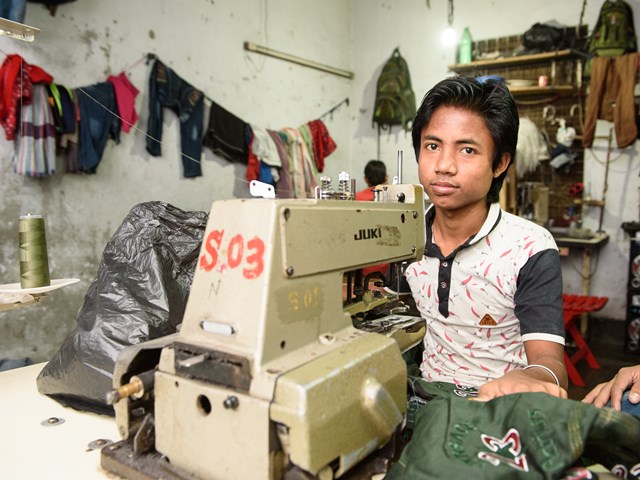Example project:
Powerful lobby against child labour paves the way to a safe future.
Read more & watch the video
Powerful lobby against child labour paves the way to a safe future.
Read more & watch the videoLet parents earn and children learn!
Many of the products we use, such as clothing and palm oil, are made by children. According to the ILO, 160 million children worldwide are victims of child labour. Trade unions play an important role in combating child labour. By increasing union membership and union capacity to conduct social dialogue, unions can effectively stand up for decent work for adults, thus eliminating the need for child labour.
Mali, Malawi, Morocco, Togo, Uganda and Zimbabwe (2019/2020):
Bangladesh (2021)
The government of Bangladesh has designated the Keraniganj neighbourhood in the Bangladeshi capital of Dhaka as an area of priority for the eradication of child labour.
Child labour has increased as a result of the COVID-19 pandemic, partly because there is no safety net if parents lose their income. The closure of schools and increases in child marriages and teenage pregnancies have also resulted in more children going back to work.
Every child has the right to education, the right to play and the right to be a child. Child labour perpetuates poverty; children do the work that would otherwise be done by adults, and children are often paid less for it. The result? Children in low-paying jobs instead of school, and parents unable to find decent work and support their families.
Together with our partners, we are committed to combating child labour and to achieving decent work for adults. We strive to strengthen unions so they can improve working conditions for adults and fight for effective bans on child labour. In addition, we work with education unions to strengthen school provisions and teachers’ skills to eradicate child labour through education and to build trust for a better social dialogue.
Mondiaal FNV fights child labour in India, Bangladesh, Mali, Malawi, Morocco, Togo, Uganda and Zimbabwe. An important part of that fight is the development of child labour free zones. These are zones, villages or communities, where children no longer work but receive proper education. All those involved in a community, such as teachers, parents, trade unions, NGOs, local associations, local authorities, religious leaders and employers, work together to eliminate child labour and to get children (re)admitted into official schools. The aim is to make the entire population aware that children's right to education must not be compromised in any way.
Powerful lobby against child labour paves the way to a safe future.
Read more & watch the video
Powerful lobby against child labour paves the way to a safe future.
Read more & watch the videoSeveral international treaties name and protect the rights of children
About Mondiaal FNV
Who we are
What we do
How we work
Integrity
Annual report
ANBI
Meld je hier aan voor onze nieuwsbrief
en ontvang maandelijks nieuws en verhalen van Mondiaal FNV.
De FNV gebruikt functionele cookies die noodzakelijk zijn om de websites zo goed mogelijk te laten functioneren. Daarnaast maken we optioneel gebruik van statistische en marketing cookies. De functionele en statistische cookies maken geen gebruik van persoonsgegevens. De marketing cookies worden gebruikt voor het personaliseren van advertenties. Onderstaand kun je toestemming geven voor het gebruik van cookies. Voor meer informatie, of om op ieder moment je instellingen weer te wijzigen, kun je terecht op onze pagina over de cookies.
Statistische cookies
:helpen ons te begrijpen hoe bezoekers onze website gebruiken (paginaweergaven, klikgedrag). Deze gegevens worden anoniem gemeten en gedeeld met drie externe partners.
Marketing cookies
:worden gebruikt om onze diensten via online advertenties onder de aandacht te brengen. Bij acceptatie van marketing cookies delen wij je persoonsgegevens met vier externe partners voor retargeting en advertentiepersonalisatie.